I Dig Sports
'Shows incredible courage to talk about mental health'
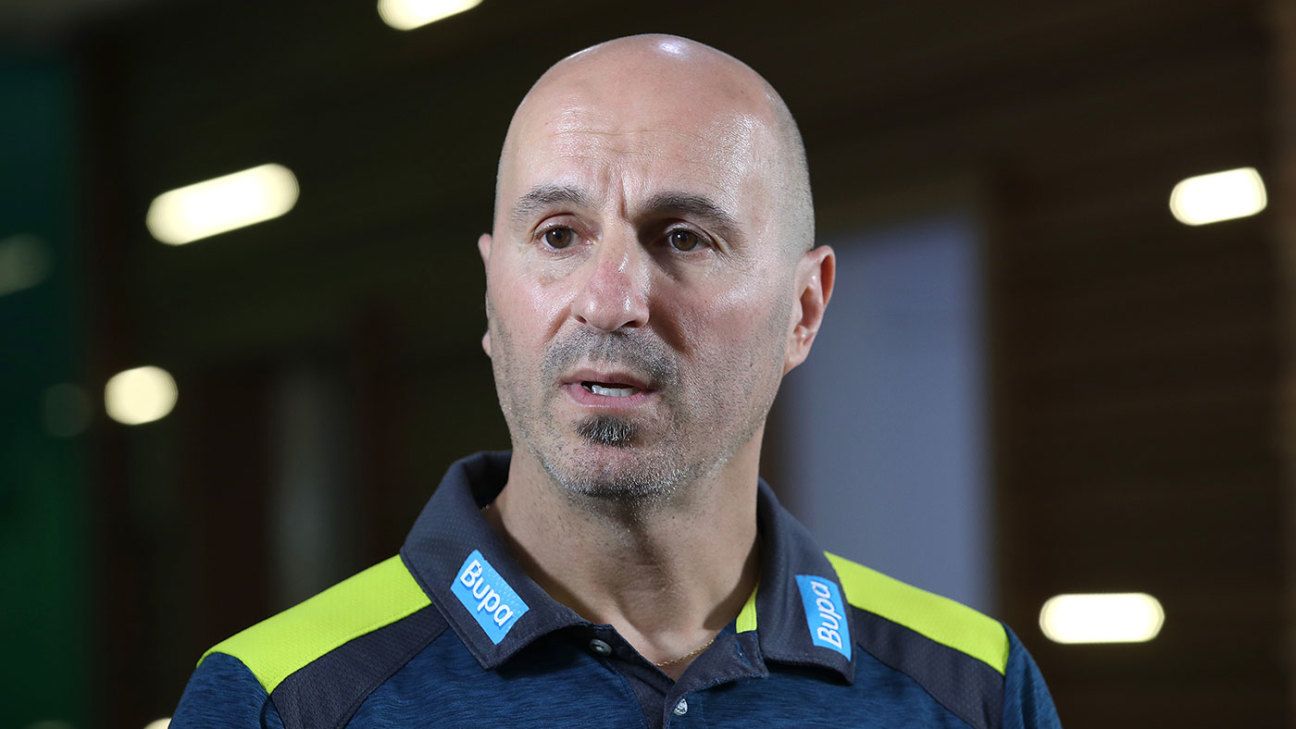
In recent weeks three Australian cricketers - Glenn Maxwell, Nic Maddinson and Will Pucovski - have stepped away from the game to manage their mental health. ESPNcricinfo spoke to Cricket Australia's head of sports science, Alex Kountouris, about how mental health is being addressed, breaking down sigmas, how players can seek help and the systems in place to aid them.
What happens in terms of support for players?
There's quite an extensive support network across Australian cricket, so some of it is internal, Cricket Australia, the state and then there's external providers. Generally players have touch points with all three of those. Obviously friends and family, but there is quite a good support network and that's something we're happy and proud about.
What we've seen with the recent three players, and we've seen with other players over the last 12 months, male and female, is players being comfortable to talk about it and ask for help. There's two benefits to that, one the players get the support they need, but also we see them as role models for society, because hopefully they encourage others who are suffering in silence to come out and talk about it and get the help they need. It's great that they are talking about it so publicly and prepared to talk about it publicly, that others can benefit from it as well.
Has Australian cricket broken down the old school perception that to admit to mental health struggles is a weakness rather than a strength?
That's certainly an old way of looking at it, but we're trying to break those stigmas and barriers down, because it's the opposite. Someone shows incredible courage to come out and talk about something like this and I expect that it will help others, rather than having a negative effect. It's a really positive thing. Overall, while we don't want our players to have issues, it's a great thing that this group of players, and other players have come out and spoken about some of the struggles they're having openly. That can encourage others to talk about it and break down some of those stigmas we know have existed in the past.
What is CA doing to improve its understanding of mental health issues?
We've conducted a survey with the Orygen mental health group, they're a provider of mental health research and education services in the youth space. We did a survey with them in the 2014-15 season then we repeated is in 2016 in the off-season and compared results. Now we're in the tail end of completing a survey again of all our male and female players and we expect by February/March next year we'll have the results of that.
For us the real benefit is we get an idea of a comparison with our previous information we had, and we also get a comparison with our players with community norms as well, similar age groups. What we've seen in the past is our players are no more or less vulnerable to mental health and wellbeing issues, so we're just a mirror of society. There may be different factors associated with why elite players have mental health and wellbeing issues, but part of the survey is trying to understand that, trying to work out some of those triggers, and it's typically not one thing, it's typically a number of factors that could cause this.
How does the players' association link into the project?
It's all done in conjunction with the ACA, co-funding the project, we've looked at the survey questions together. Then together with the ACA we've got a wellbeing education program that's just about to kick off as well. That's been probably 12 months in the pipeline, and will be across all the different players in the state and CA system and they get education around mental health and wellbeing. Hopefully the players can pick up some of the skills and awareness they need to better understand this and pick it up earlier.
If you want to take a step even further than that, we're doing a research project with the Orygen group on our pathway players. That's happening next month, looking at our younger players that we haven't captured before, and try to understand some of the challenges there. We've also resourced our pathway championships with a full-time psychologist there.
Cricket's volume and frequency of travel is a unique challenge for players and staff. Can you use the networks that grow around teams to help anyone who is struggling get the support they need before they actually have to pull out of playing or coaching?
Travel's an interesting one, it's very individual how it affects people. But we've got pretty good support networks when our teams are on tour, so we've always got a doctor for all our tours, whether they're pathway tours or our men's and women's teams, or Australia A. Increasingly we've got our psychologist travelling with some of our teams as well as support. But it's just very individual, trying to offer what players need and pick things up early and offer the support they need.
It's also about looking ahead and seeing what the travel schedule is going to be like and trying to manage that. But travel is only one of many potential triggers. It's probably one that's more akin to elite athletes, one of a handful of things that might be more relevant for elite athletes, but there's other things that are common to everyone in society, things like relationships, stresses of work and the everyday stresses of life.
One thing that has been seen in the mental health area is that making face to face contact or picking up the phone to admit to needing mental health support or a break can be harder than sending a message, an email or putting the information into an app. Do the players have that option at the moment?
There's nothing specific, and I can't tell you how the recent players declared how they felt but it will be different for everyone. One of the things we do is expect players to log in wellness information every day on an app. On this app, which is common across elite sport, you say how sore you are, how fatigued you are, and one of the questions is how stressed you are and how you feel overall in your wellness.
That's tracked by each player's support network so we pick up things like that sometimes. So if you see a player hasn't slept well for three or four days or they've reported high levels of stress for two or three days, then someone will get in touch. It might be 'I've had a sore neck and I couldn't sleep properly' or it might be 'I'm really struggling with stress' and the right people will then follow that up. That might be the way players provide information, other will be happy just to talk about it.
We also have a monthly mental health and wellbeing screening tool that's available to players on an optional basis in our internal app. That again can be a way to flag something, even if players and support staff don't feel like they want to do the survey, we still encourage them to go through and look at the questions and reflect on the questions. If something resonates with them that's not quite right, speak to the right person.
If you look at the way cricket is evolving, and the increasing number of teams players play for, is that providing an additional challenge where in the past they maybe only had two or three team environments to move between at most?
Some players will be affected more or less by swapping teams and things like that. The challenge is making sure the support network is there and having the ability to talk to someone. As you move from one team to another, there's different support staff, different people, different levels of relationships between people and one of the things we like about the wellness information we collect is that can be done every day, no matter where you are. Someone could be in India playing in the IPL and they report they haven't slept well for three days and someone will get in touch and say 'what's the story'. It may just be jetlag and that's not a problem, or they'll tell you 'I'm really struggling' and that can start the conversation.
It does throw up a challenge, but we've got some things in place that we think can help us identify some of the tough periods and it comes back to the player's willingness to share that information doesn't it. If they're not telling us the information we don't have it. There are lots of different avenues for the player to report the information. But the work we're doing with the Orygen group will help us understand where we need to be putting our resources. It's all about educating the players about what to look for and what some of the stresses are, and really trying to better understand mental health and wellbeing.
Tour match toil serves England reminder of daunting New Zealand challenge
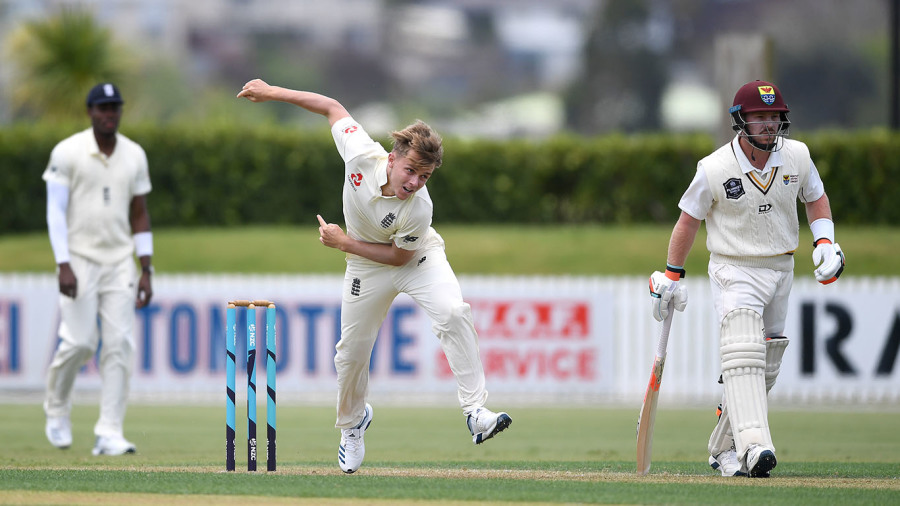
England 26 for 1 trail New Zealand A 302 for 6 declared (Phillips 116, Rutherford 59, Blundell 60) by 276 runs
If England had any doubts about the magnitude of the task facing them over the next few weeks, they will have been dispelled by a tough day in the field in Whangarei.
Unable to coax movement from the ball or life from the surface, they were instead obliged to wait for the declaration from a New Zealand A batting line-up containing three men with Test experience. Glenn Phillips, a 22-year-old batsman with more than a hint of Steve Smith about him, recorded the fourth century of his first-class career and England conceded 3.59 runs an over.
The loss of Rory Burns, who cut a long-hop to point moments before the close, rounded off the challenge. The appearance of Jack Leach as nightwatchman seemed an oddly negative response. The purpose of such games is, after all, to put players under pressure in order to prepare for challenges to come.
Afterwards, Darren Gough - England's short-term bowling consultant - was full of empathy for his charges. He had his share of such days, after all. But, among the words of support and respect, there was a reminder that the best, as he put it, "find a way" to succeed in such conditions.
"The way I look at it," Gough said, "is that New Zealand's bowlers, Trent Boult and Tim Southee, bowl at 85 mph and they somehow find a way to take wickets on New Zealand pitches. The ball has to swing here, because they are swing bowlers and they have good records. You have to find a way."
Ben Stokes suggested that the pitch was "seriously flat" and that it had provided a useful challenge. "[It was] a bit surprising," he told Test Match Special, "but that's a great test for us as a bowling group to be exposed to. It was a great opportunity for us to try a few different things; set different fields, bowl to different plans that we normally wouldn't."
As ever with such warm-up games, it probably pays not to read too much into the statistics. Many of this England side are now pretty experienced and will not be striving for peak performance in such circumstances. It's all about being ready for next week.
But it was, Jofra Archer aside, hard to see where England were going to find the weapons to damage New Zealand. On these surfaces, with this ball, Kane Williamson looks a desperately tough proposition.
Archer's third spell was probably the day's highlight from an England perspective. Generating sharp pace from a docile wicket and an old ball, he unsettled the batsmen with some well-directed short-balls. Phillips took one blow to the forearm and was thrown off his feet as he jerked his head out of the way of another. Earlier Hamish Rutherford had been struck on the side of the head by an Archer bouncer, but looked in excellent touch before departing in somewhat unfortunate fashion as he feathered an edge down the leg side.
England's problem, though, is that their opposition know Archer cannot bowl forever. And with no Mark Wood or Olly Stone in reserve, it is hard to build the required intensity from an attack that lacks the pace to sustain Archer's threat. Ben Stokes could, perhaps, fulfil the role of fast-bowling foil to Archer - he certainly bowled fast enough on slow surfaces in Sri Lanka - but in this game, understandably, was probably holding back just a little.
While Stuart Broad struck early, neither he or Sam Curran carried much threat for the rest of the day. Curran came back pretty well after a disappointing first spell but he could face a tough series if he is unable to coax any swing from these balls. Stokes, while expensive, took two quick wickets after deceiving Tim Seifert with what appeared to be a slower ball and then saw Jimmy Neesham play-on as he attempted a forcing stroke. Leach conceded three fours in five deliveries at one stage but only conceded one more in his 26 overs. Again, there is nothing in these conditions for Leach but if he can restrict the scoring rate to 2.15 an over as he did here, he can feel he has done a decent job for his team.
One thing is certain: if England are to win here for the first time since 2008, they will have to hold their catches. On the first day of this match, Dom Sibley, at second slip, put down a relatively simple stomach-height offered by Phillips on 27 off Stokes. These things happen, of course, but they are starting to happen just a little more often than can be ignored. Tom Blundell was reprieved on 60, too, when it caught behind off what turned out to be a no-ball, though he was very well caught at mid-wicket next ball.
There was also an injury scare. Root was forced off the field for a while after landing heavily when diving to prevent a boundary at long-on. He was subsequently diagnosed with a jarred hip, but returned to field well before stumps. It is not anticipated there will be lasting consequences.
In the longer-term, Gough felt Saqib Mahmood could be the sort of bowler who could make inroads in such conditions. With his pace, his somewhat slingy action and a willingness to pitch the ball full, he would appear to have the ingredients to reverse this kookaburra ball as Gough once did. "He's different to the others," Gough said. "He's another option when the pitch is flat. We're working on reverse. He has the natural talent to do it and he's desperate to be better at it. He's keen to learn."
Some may point to Curran's figures and suggest Chris Woakes was unfortunate to miss out here. And it is true that Woakes, with his extra pace, can at least force batsmen on to the back foot a little more readily. He also feels his recently-acquired ability to bowl the wobble seam gives him a new weapon in such conditions. But it's not as if he has not had chances in such circumstances and it may well be wishful thinking to suggest he would have provided any more of a cutting edge. As Gough said later, while recognising Woakes' skills, "whether he has to do something different to the past away from home, it will be interesting to see if he gets an opportunity and realises that." The slightly depressing truth is, after years of playing county cricket on seaming wickets and with a Duke's ball, there are very few England bowlers who will flourish in these conditions.
ALSO READ: Curran set for Test berth ahead of Woakes
"I've not seen a swinging ball in the two weeks I've been here," Gough said, though he did admit he had managed to swing it in the nets. "At about 70 mph. And that's a big difference. If it swings, it will be for the first eight or nine overs."
Whatever happens on this tour, the influence of Gough has been perceived as a success. The combination of a fresh voice and his vast experience have provided new ideas to experienced bowlers who have probably heard rather a lot of the familiar, somewhat homogenised ECB voices. Gough, positive but prepared to offer some home truths where necessary, has encouraged new ideas. It seems unlikely he will be lured into anything like a full-time role - he enjoys his radio job too much for that - but conversations about future consultancy spells with England's bowlers are ongoing.
Jofra Archer spell 'the quickest I've faced in my life' says centurion Glenn Phillips
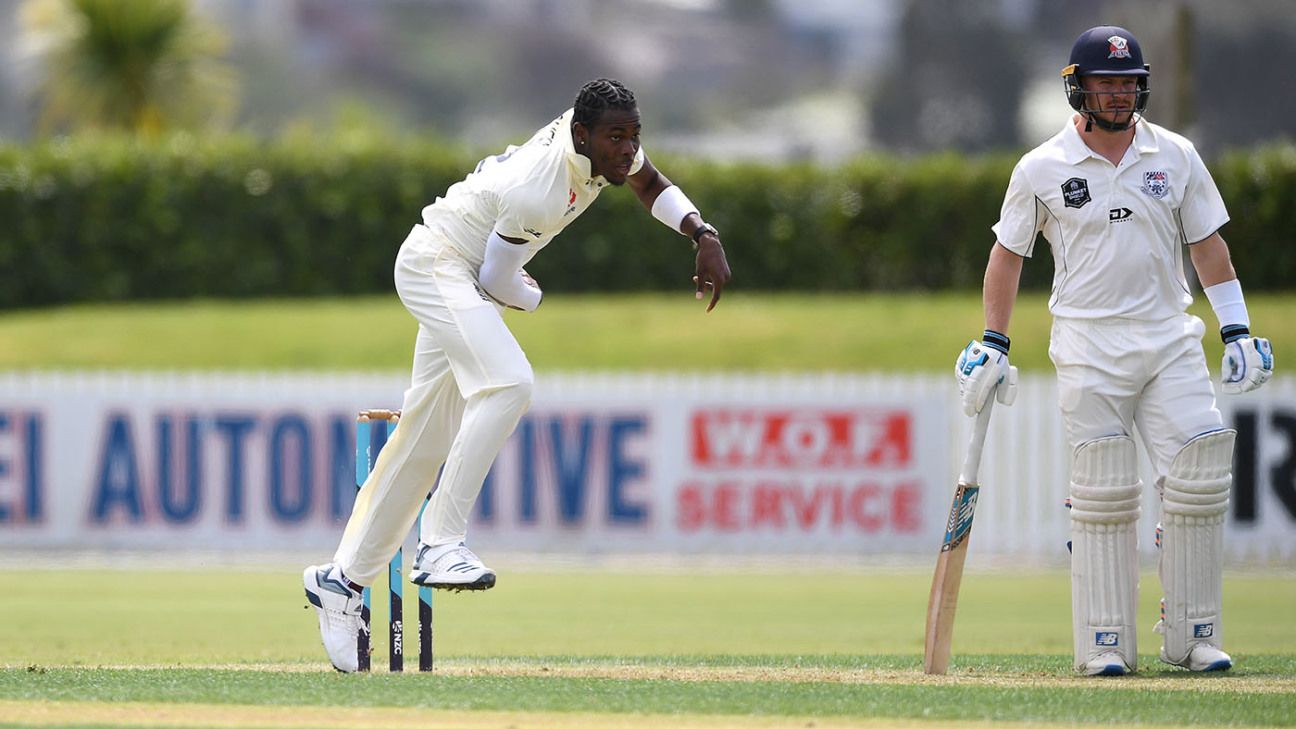
Glenn Phillips was left sporting several bruises and a very large smile after a memorable encounter with Jofra Archer on the first day of New Zealand A's match against England.
Phillips, a top-order batsman with almost a dozen international caps behind him, made an impressive century in New Zealand A's first innings and later declared the experience "the most fun you can have".
It didn't always look it. In one spell in the afternoon session, Archer delivered a succession of short balls that saw Phillips struck on the body several times and just avoid a blow to the head on several more.
To his credit, however, Phillips appeared to relish the challenge and could look back on the day with great satisfaction. But he was also full of respect for Archer, suggesting he was the quickest bowler he had faced.
"My goodness," Phillips said. "That was the quickest I've faced in my life. The challenge was unbelievable.
"He got me on the forearm, he nearly took my head off a couple of times and then he took me on the chest a couple of times.
"With Steve Smith getting hit a couple of months ago, it [the fear of injury] is in the back of your mind a bit as he's running in a bit. But he's not out there in trying to intentionally hurt anyone. It's more a tactical thing. If you're watching the ball, hopefully you should be OK. But if you happen to be in the wrong place at the wrong time…
"It's the most fun you can have out there. There's no point it being easy, especially when a guy is running in trying to take your head off. It might not be his wicket-taking ball, either. So the challenge is to make sure you survive and get out of the spell.
"The wicket flattened out quite nicely in the end so it was good to bat on. It was a lot of fun."
Phillips and Archer had actually played against one another previously. In 2016, when Archer was just starting to make his way in the Sussex Second XI, Phillips was playing for MCC Young Cricketers. . On that occasion, he scored 24 in the first innings and 43 in the second with Archer unable to dismiss him on either occasion.
"He was all over me back then, too," Phillips admitted. "He's was probably as quick then as he is now, but there's more spotlight on him now so people are understanding just how quick he is.
"What advice would I give to the New Zealand team if they ask? Just watch the ball as hard as you can. Like any bowler, he does give you bad balls. But he's very accurate with his short-ball plan."
George is here, and the Clippers have shown that he is necessary

NEW ORLEANS -- Cold outside air poured through the loading dock a couple of hundred feet from tunnels leading out to the floor, coating the lower bowl at Smoothie King Center on Thursday with a chilled draft. For the first time this season, Paul George took the court for a pregame warm-up and the first thing he needed to do was exactly that -- warm up.
He picked up two basketballs to go through his dribbling routine, but after losing one, he stopped to blow some hot breath over his hands. His LA Clippers debut was some 60 minutes away, and with expectations casting a dense fog around the team, he was focused on just getting back.
It wasn't the fully operational Clippers on the floor, though, against the New Orleans Pelicans.
On the second night of a back to back where he played 41 minutes, Kawhi Leonard sat courtside to watch George. No Patrick Beverley either. Beverley returned to Los Angeles after a minor injury Wednesday. Their absences were felt, with defensive breakdowns allowing the Pelicans to score 132 points in a Clippers loss. The most glaring one being late, with Frank Jackson hitting a wide-open 3 with 29.8 seconds left in a three-point game. During an ensuing timeout, George and Lou Williams had an extended conversation a few steps from the bench with lots of pointing and nodding.
"You could clearly see, defensively, he was mixed up in some coverages tonight," Clippers coach Doc Rivers said, "and that's just gonna take time."
George was frustrated with the defensive miscues, calling his performance "terrible" about 20 minutes after Rivers called it "sensational." It figures, considering George is a defense-first player who evaluates his game primarily on that end of the floor. George dropped an efficient 33 points (10-of-17 shots, 3-of-5 3s) in 24 minutes, his most points in his first game of a season in his career. But he had to play the entire fourth quarter with five fouls, and he had four of his five turnovers in the final period as New Orleans guard Jrue Holiday upstaged George to close out a Pelicans win.
George also gave up five uncontested made shots as the closest defender Thursday, tied for his most in a game since Second Spectrum began tracking in 2013-14. The three uncontested 3s George gave up as the closest defender were his most in a game in the same span.
"It's just good to get this one under my belt," George said. "This was essentially like my first preseason game. So it's a lot to take from this, and take it into the next game."
That next game is Saturday against the Atlanta Hawks at Staples Center, and should finally feature Leonard alongside George. It's a combination that shook the NBA this summer, with their long-limbed defensive ball-hawking and complete offensive proficiency. There's always a question of how two megawatt stars will fit together, but with George and Leonard, it feels like a natural pairing.
George is one of the most elastic superstars in the league, able to adapt and adjust to almost any required role. It's oversimplifying things, but put it this way: If you can fit with Russell Westbrook, you can fit with anyone. George is well-rounded; so is Leonard. They don't need the ball to be great, but certainly can be when they have it.
Paul George on Clippers debut: 'I thought I was terrible'
After his Clippers debut, Paul George says he needs more time to get a feel for real-time game-speed activities despite dropping 33 points in just 24 minutes of action.
"It was seamless," Rivers said. "He ran plays like he'd been running it for weeks, months; and I was shocked by that. We ran a very difficult play for him; he scored six points out of it -- it's all timing. And when we saw he could do it, we kept running it. We were surprised. You gotta give him credit; he must've watched a heckuva lot of film in all that to be that prepared."
But George solves one other primary issue that has been nagging at the Clippers early this season. So far, it feels as if Leonard or Williams has been on the floor at all times this season, and that has been out of complete necessity. When both have sat this season entering Thursday night's game in New Orleans, the Clippers had an anemic 79.5 offensive rating and a net rating of minus-20.5 in 36 minutes.
It's small sample size theater, but against the Pelicans, the Clippers outscored them by seven points when George was on the floor compared to getting outscored by a decisive 12 points when George sat.
There's no reason to believe Rivers won't concoct a rotation that staggers George, Leonard and Williams to correct that problem quickly. Leonard, especially, will benefit from the relief George can provide as a shooter, driver and playmaker. According to ESPN Stats & Info information research, Leonard is on pace to set a career-high usage percentage of 36.6, which would rank second in the NBA behind only James Harden. (There's also the conversation of load/injury management, and just to state the obvious: Now when Leonard takes a night off, the Clippers have the other best two-way wing player in the league playing still.)
"I'm fully excited for this whole team to come together -- play with Pat, with Kawhi," George said. "I'm looking forward to this team being at full strength."
Which is something George finally is himself. He played last season with shoulder issues plaguing him throughout, with a torn tendon in his right rotator cuff causing problems any time he took a knock in the wrong spot. A week before the Oklahoma City Thunder's Game 1 playoff game against the Portland Trail Blazers in the first round, George couldn't lift his arm over his head. He had surgery on his left shoulder, too, having a torn labrum repaired. The rehab kept him out until now, but if his first game back is any indication, it doesn't look as if he missed a beat.
The Clippers are a title favorite for a reason, and it wasn't because of the team they had the first 12 games. It's for the one they expect to have the final 70.
"We haven't played very well yet," Rivers said. "But we also haven't been healthy yet."
Rivers has repeated a phrase often and he did it again Thursday: "We won the summer; now we want to win the season."
And for the Clippers, that season finally begins now.

Wang Chuqin has withdrawn from all three events in which he was scheduled to compete in Linz, the men’s singles, the men’s doubles partnering Fan Zhendong and the mixed doubles in harness with Liu Shiwen.
The suspension for the 19 year old, who just over one year ago won gold at the Buenos 2018 Youth Olympic Games, concludes on Thursday 13th February; thus his attendance at the ITTF World Tour Grand Finals, in which he has qualified to compete in the men’s singles event, is now in doubt.
Furthermore, he is one of the nominees in the “Breakthrough Star of the Year” category at the Star Awards Gala.
The situation arose after the dramatic concluding preliminary round match between against Zhao Zihao. Out of form, Wang Chuqin lost the first three games, he recovered, levelled but lost the deciding game (12-10, 11-7, 11-6, 6-11, 5-11, 6-11, 11-9). Disappointed, in the heat of the moment he through his racket at the table, thus contravening the ethics of sport.
Notably the match was in sharp contrast their meeting just over one month ago in Sweden when en route to the title, at the quarter-final stage Wang Chuqin had beaten Zhao Zihao in four straight games (11-6, 11-6, 11-7, 11-5). No doubt that fact added the frustration of a player known for his calm and resolute approach.
It is the latest sign of the zero tolerance policy adopted by the Chinese Table Tennis Association for any form of indiscipline. Earlier this year both Zhou Yu and Fang Bo were suspended for incidents that concerned the infringement of regulations.
The Chinese Table Tennis Association released the following translated statement:
“During the ITTF World Tour Austrian Open, Wang Chuqin, a member of the Chinese table tennis men’s team, was deemed to be out of control when he lost to his national teammate Zhao Zihao. He deliberately threw his racket at the table and almost harmed his teammate.
As a result of this irresponsible move on the court, and as the head coach of the men’s team, I would like to apologise to the referee and the fans. With Wang Chuqin suspended, he and his supervisor Liu Guozheng are immediately returning to China for reflection. In the coming days, the coaching team of the national table tennis team will help Wang Chuqin to understand and correct his behaviour. We assure everyone that this will not happen in the future.
Wang Chuqin will also withdraw from the remaining doubles and mixed doubles in the Austrian Open. Although it affects the results, in the face of the extreme signs of young players’ thinking and behaviour, we must take care of the rules and value the education and growth of young players above all else. Only proper management can help young athletes correct their attitudes in the growth period and become more outstanding people.
Here, we apologise again to the fans. The national men’s team coaching team will also deeply reflect on the problems of negligence within the team members, as well as strengthen the ideological and moral education of coaches and athletes, to maintain the respect of the audience, the opponents, the referees, and keep in mind the spirit of the national team.”
Australia's other tricky decision: who is the third fast bowler?
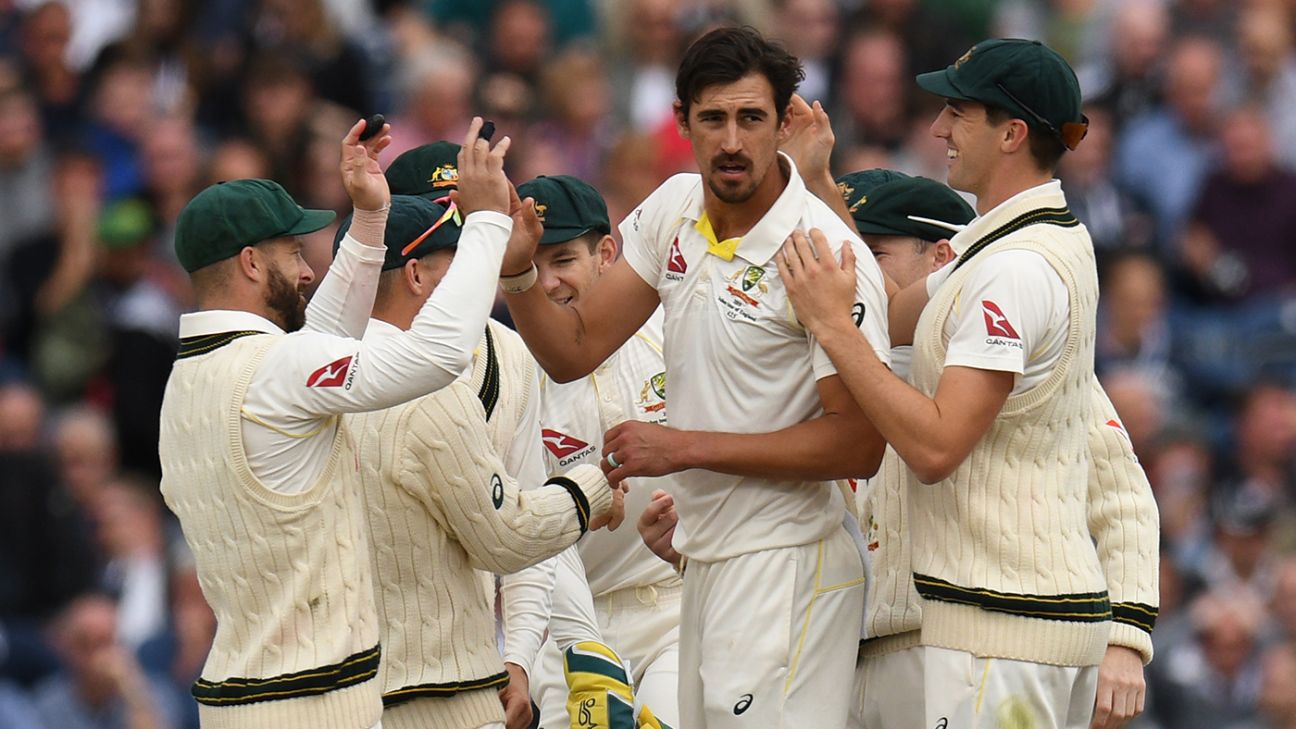
Strength in depth is something the Australian selectors would dearly love with their batting options. They have in it in spades with the fast bowling, however, and that creates a different problem.
The selection of Pat Cummins, Josh Hazlewood, Mitchell Starc, James Pattinson and Michael Neser in the Test squad to face Pakistan looks like a luxury teams the world over would love to have.
Now it's about which three to pick for the Gabba. The selectors rotated their fast bowlers with mixed success in England. Heading into the final Test at The Oval they seemed genuinely unsure of their best trio, with Peter Siddle playing ahead of Starc and Pattinson who were both fully fit.
Pattinson, perhaps to his own detriment given his desire to play his first Test on home soil since January 2016, thinks the New South Wales trio of Cummins, Hazlewood, and Starc will line-up in Brisbane.
ALSO READ: James Pattinson wants to play back-to-back Tests
"I think those three are probably going to get the first look in, realistically," Pattinson said on Thursday. When probed as to whether the selectors had indicated that to him he responded, "Not really, that's just my personal opinion."
The New South Wales trio tuned up for Brisbane by dismantling Western Australia on a slow dry SCG track, the antithesis of what will be presented at the Gabba. The trio took 13 wickets between them on a spin-friendly surface to bowl WA out for 191 and 128. All three were outstanding with a reverse-swinging ball.
They were the trio that secured the Ashes for Australia at Old Trafford, in Starc's only Test of the campaign, but he was unsure whether they would get the nod together in Brisbane.
"We've all said we are here to win games for New South Wales and the rest of it will take care of itself," Starc said. "For this week it was nice to have everyone back in blue, Patty's [Cummins] first game and was nice seeing him bowl fast as well. We've played a lot of cricket together for New South Wales and Australia and if that's the way they go in the first Test then great, if not keep pushing for the next one."
Starc's form probably makes him the favourite to be named alongside Cummins and Hazlewood, who appear certain starters. After a lean match at the Gabba against Queensland, where he claimed 1 for 129, some remedial work with NSW bowling coach Andre Adams propelled him to a man of the match display against Tasmania at Drummoyne Oval where he took 10 for 60 from 43.2 overs.
He then took eight wickets in six T20Is but stepped back into Shield cricket without missing a beat, claiming 4 for 57 in the second innings against Western Australia with some vicious reverse swing and six wickets in the match
"I've just been happy with the rhythm and things I've worked on, just to get into a clearer mindset," Starc said. "The things I worked on coming out of the Gabba Shield game and into Drummoyne I've been pretty focused and clear since the Gabba - in the T20s as well - so that's pretty pleasing. Hopefully having that mindset can carry on through the summer."
Pattinson's form in the Sheffield Shield should not be overlooked. He consistently troubled opponents with pace and hostility on three very flat surfaces at the Junction Oval, the WACA and the MCG. He was rested for the game against Tasmania on a bowler-friendly surface in Hobart. He has 11 wickets in four innings thus far this season with two four-wicket hauls but has bowled without luck at times.
The squad mentality has been spoken about at length, with Australia's hierarchy keen to sell the idea to the fast bowlers to both keep them fresh and extend their careers.
Pattinson spoke last Friday of his desire to play back-to-back Test matches and his envy of the batsmen being able to find form through continuity of playing.
But it seems the bowlers, begrudgingly or not, have accepted their fate that they may not play every game.
"We spoke about the squad mentality during the Ashes and having five fast bowlers again it will be the same thing," Starc said. "Whether that's conditions-based, Nes [Neser] bowled really well in that A game from what I've heard and Patto has been bowling really nicely. Joshy, Patty and myself are pretty happy with how we've been progressing."
While Pattinson believed he would not play in the first Test he did believe that his opportunity would come depending on conditions.
"I think it's just a game to game basis, however, they pull up. If I'm just there staying fit and bowling well and putting my name forward, hopefully at some stage I'll get the nod."
Seifert: Garrett deserves record punishment
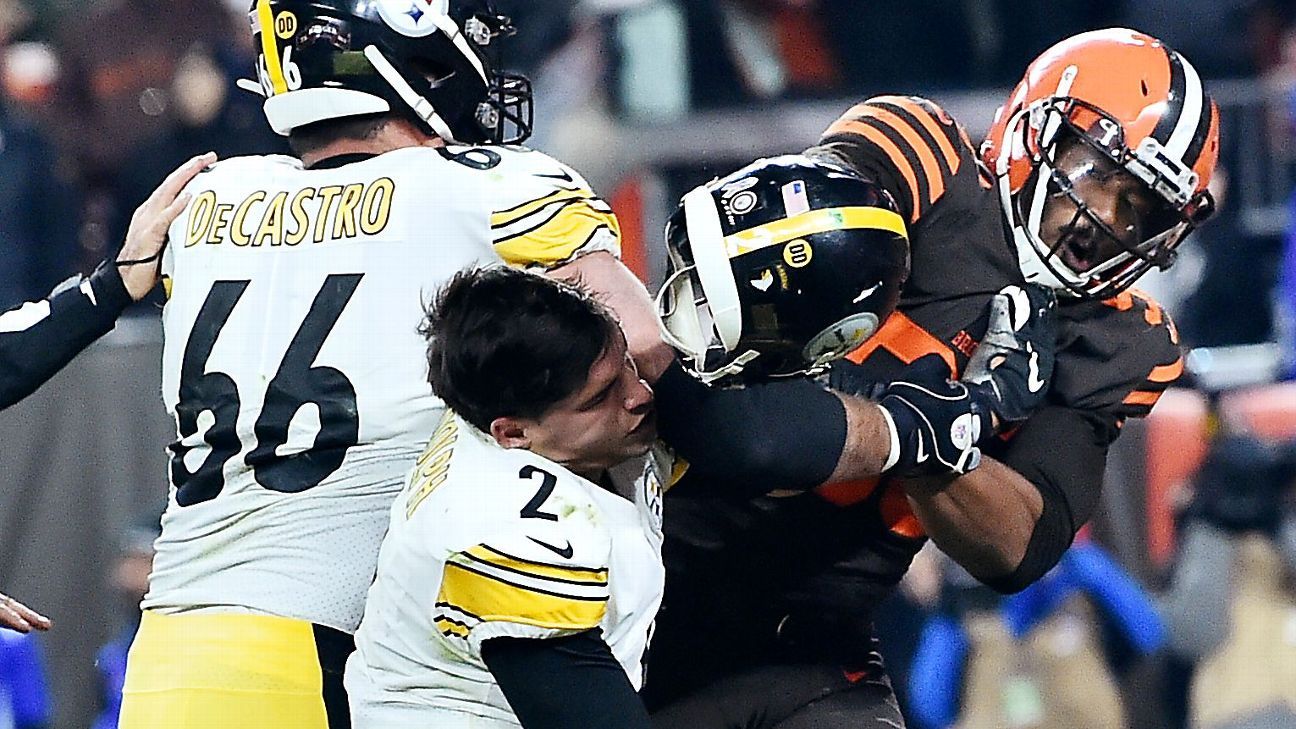
On Thursday night, Cleveland Browns defensive end Myles Garrett committed the closest thing we've seen to an on-field crime in the modern era of pro football. Only one response will suffice. The NFL must issue the longest suspension for a single on-field act in its history, ending Garrett's 2019 season with six games remaining on the Browns' schedule and making clear to the world that what happened at FirstEnergy Stadium is one of the worst moments on the field in its history.
Such discipline, as harsh as it might seem, won't be particularly controversial to anyone who saw Garrett rip off Pittsburgh Steelers quarterback Mason Rudolph's helmet and then use it to pummel his unprotected head. If Garrett hit someone with a helmet on the streets of Cleveland, he would face arrest. The outburst left grizzled football veterans gasping at its sheer violence, a throwback matched by only a handful -- if any -- of intentional acts in 100 years of league play.
Garrett clubs Rudolph with helmet as fight breaks out
Myles Garrett hits Mason Rudolph in the head with a helmet as a fight breaks out at the end of the Steelers-Browns game.
The length of Garrett's absence shouldn't be too tough for the NFL to figure out. It suspended Oakland Raiders linebacker Vontaze Burfict indefinitely earlier this season for an accumulation of on-field acts, culminating with a helmet-to-helmet hit, but the longest suspension it has issued for a single on-field incident is five games. That happened in 2006 when then-Tennessee Titans defensive lineman Albert Haynesworth ripped the helmet off Dallas Cowboys center Andre Gurode and then kicked and stomped on his face. Gurode needed 30 stitches to close the wounds.
Rudolph was lucky to avoid a similar fate, or worse. The stunned expression on the face of Browns quarterback Baker Mayfield, speaking moments later in an interview on Fox, depicted the weight of the scene. Mayfield couldn't summon an ounce of defense for his teammate.
"It's inexcusable," he said. "That's just endangering the other team. ... The reality is he is going to get suspended. We don't know how long, and that hurts our team."
Don't forget that Rudolph was knocked unconscious last month by a hit to his helmet and missed one game. The contact from that blow, initiated by Baltimore Ravens safety Earl Thomas, was so severe that Rudolph's eyes were closed before he hit the ground. If you knew that context, you were surely cringing as you saw Garrett bash Rudolph's head, topped off by Browns defensive lineman Larry Ogunjobi pushing Rudolph to the ground from behind. Steelers center Maurkice Pouncey then entered the fray, kicking and punching Garrett and escalating the scene to a point where it wouldn't have been surprising to see police officers on the field. (Rudolph did pull at Garrett's helmet while both were on the ground, but that bit of aggressiveness hardly merited the response.)
"I lost my cool, and I regret it," Garrett said afterward. Rudolph called it "cowardly" and "bush league" after the game. But I'm sorry, using normal words to describe a singular act of violence risks assimilating it into all the other dirty and unsportsmanlike plays we've seen in football.
This was worse than Chuck Bednarik's knockout of Frank Gifford in 1960. It was worse than Jack Tatum's hit on Darryl Stingley in 1978, one that ultimately left Stingley paralyzed. Those plays, the first two that come to mind in the NFL's history of on-field violence, were part of the flow of game action. Bednarik clotheslined Gifford in a tackle technique that was not uncommon in that era. Tatum lined up a hit to the head of Stingley, who was stretching for the ball in what would now be considered a defenseless position.
They were violent, unnecessary and exceedingly damaging. Garrett's absurdity, on the other hand, came after the whistle, outside of any semblance of competition.
Pouncey: Garrett should absolutely be suspended for the season
Maurkice Pouncey says the NFL should suspend Myles Garrett for the rest of the season after hitting Mason Rudolph in the head with a helmet.
There are few precedents in NFL history that come close to matching it. Haynesworth's stomp is one. In 2013, meanwhile, Antonio Smith ripped off the helmet of Richie Incognito and swung it close to his face. For that, Smith was suspended for three games. In 1954, according to pro football historian Dan Daly, Colts defensive end Don Joyce hit Rams linebacker Les Richter with a helmet, for which he was ejected but not suspended.
That, of course, was 65 years ago.
The NFL should be eager to demonstrate its mettle at a time when it has never been more cognizant of a responsive to brain health. There should be little debate Friday at the league headquarters in New York City. Commissioner Roger Goodell should want the world to know how exceptional this situation is. Football can't be like this anymore.
But the truth is that it has rarely -- if ever -- been like this. The NFL's punishment should reflect that sobering fact.

Favourite for gold, the top seed; in the later rounds, Ivor Ban accounted for Peru’s Carlos Fernandez, the no.7 seed (11-5, 7-11, 11-4, 11-3, 11-6), prior to overcoming Spain’s Albert Villadrel, the no.13 seed (11-8, 11-3, 11-9, 14-12) to book his place in the final.
Notably, Albert Villadrel was a player in form; in the second round he had ousted Italy’s John Oyebode, the no.3 seed (11-9, 11-9, 11-9, 11-6), before recording a quarter-final win in opposition to Portugal’s Gonçalo Gomes (9-11, 11-6, 8-11, 11-8, 6-11, 11-9, 12-10).
A place in the final booked, Ivor Ban maintained his good form; he overcame Chile’s Nicolas Burgos, the no.2 seed, in six games to arrest the title (11-9, 9-11, 11-13, 11-8, 11-6, 12-10). Earlier at the quarter-final stage, Nicolas Burgos had accounted Spain’s Iker Gonzalez (11-6, 11-6, 11-8, 11-4), prior to overcoming Moldova’s Vladislav Ursu, the no.4 seed (11-9, 11-7, 11-7, 10-12, 12-10).
Runners up spot
Gold for Ivor Ban, in the junior boys’ doubles event the colour had been silver. Partnering colleague Lovro Zovko, the duo experienced defeat in the final at the hands of the French pairing formed by Denis Dorcescu and Felix Lebrun (11-7, 11-7, 10-12, 8-11, 11-8).
Earlier in the day at the semi-final stage, Ivor Ban and Lovro Zovko beat Italy’s Tommaso Giovannetti and John Oyebode (11-7, 8-11, 11-7, 11-3); Denis Dorcescu and Felix Lebrun accounted for Spain’s Miguel Nuñez and Arnau Pons (7-11, 11-2, 11-2, 11-8).
Two titles
A successful day for Ivor Ban, it was even more successful for Hana Goda; in addition to emerging the junior girls’ singles champion, she partnered colleague Farida Badawy to junior girls’ doubles success.
Occupying the top seeded position in both events, she secured the junior girls’ singles title at the final expense of Emine Ernst of the Netherlands, the no.3 seed (11-5, 11-8, 11-8, 11-6), having at the quarter-final stage overcome Portugal’s Patricia Santos, the no.14 seed (10-12, 11-4, 11-2, 11-8, 11-9) and in the penultimate round, Veranika Varabyova of Belarus, the no.22 seed (11-4, 11-7, 11-8, 11-5).
Impressive from Hana Goda, in the opposite half of the draw it had been the same from Emine Ernst. In quarter-finals she had beaten the host nation’s Matilde Pinto (11-6, 2-11, 11-7, 11-7, 11-5) the winner the previous round in opposition to Hungary’s Helga Dari, the no.2 seed (12-14, 11-7, 8-11, 11-7, 11-8, 11-8). A notable last eight success, Emine Ernst booked her place in the final courtesy of success in opposition to Farida Badawy, the no.4 seed (11-9, 7-11, 11-9, 11-3, 11-9).
Top prize
Disappointment for Farida Badawy but the top prize in harness with Hana Goda.
Following success against the pairing of Spain’s Claudia Canay and Tunisia’s Fadwa Garci (11-7, 7-11, 11-9, 11-3), the duo clinched the junior girls’ doubles title at the final expense of the partnership formed by Hungary’s Helga Dari and Faith Tung of the United States (11-8, 11-5, 11-9).
In the counterpart semi-final, Helga Dari and Faith Tung had beaten England’s Mollie Patterson and Millie Rogove (11-9, 13-11, 2-11, 11-9).
Attention in Guimarães now turns to the team events, the finals of which will be played on Saturday 16th November.
Upsets but Qian Tianyi overshadows all others

The win rather masked the quite outstanding efforts of Japan’s 15 year old Miyuu Kihara; she ousted Romania’s Bernadette Szocs, the no.13 seed and in some style; a straight games win was the order of the day (11-8, 11-8, 11-6, 11-4).
Likewise in the opening round of the women’s singles event, just as Qian Tianyi beat an illustrious colleague and Miyuu Kihara showed no charity, so did Hina Hayata. She overcame Japanese teammate Miu Hirano, the no.5 seed, in straight games (12-10, 11-9, 11-4, 12-10).
Notable performances, it was the same from China’s Gu Yuting and Wang Yidi. In the opening round, Gu Yuting beat Singapore’s Feng Tianwei, the no.8 seed (11-8, 9-11, 11-8, 8-11, 11-7, 13-11); Wang Yidi ended the hopes of compatriot Chen Xingtong (9-11, 11-8, 5-11, 11-6, 11-8, 11-6).
Experience
Similarly, now 36 years old and a member of the more experienced brigade, Germany’s Han Ying overcame Austria’s Liu Jia, the no.16 seed (11-8, 11-9, 11-5, 11-3).
Disappointment for the host nation but there was success; in the contest that brought the day to a conclusion, by the very narrowest of decisions, Sofia Polcanova, the no.12 seed, accounted for Korea Republic’s Choi Hyojoo (13-11, 8-11, 13-11, 9-11, 8-11, 16-14, 12-10).
Upsets but with the exception of Liu Shiwen for the remaining leading names it was first round women’s singles success. China’s Zhu Yuling, the top seed, beat Luxembourg’s Ni Xialian (12-10, 11-8, 11-5, 11-7); Japan’s Mima Ito, the no.3 seed, overcame Monaco’s Yang Xiaoxin (11-9, 14-12, 12-10, 11-5); colleague, Kasumi Ishikawa, the no.4 seed, prevailed against Chinese Taipei’s Chen Szu-Yu (11-9, 12-10, 11-9, 11-7).
Opening round surprises
Similarly in the opening round of the men’s singles event there were surprises; pride of place going to England’s Liam Pitchford and Slovenia’s Darko Jorgic. Liam Pitchford beat Japan’s Jun Mizutani, the no.11 seed (8-11, 11-1, 11-2, 9-11, 11-8, 13-15, 11-3); Darko Jorgic accounted for Korea Republic’s Jang Woojin, the no.12 seed (11-5, 9-11, 8-11, 11-9, 14-12, 15-13).
Defeat contrary to status for the Korea Republic, for Jeoung Youngsik it was the reverse situation; he beat Germany’s Patrick Franziska, the no.13 seed (4-11, 11-9, 11-6, 9-11, 11-5, 11-9) to reserve his place in round two.
Problems for Patrik Franziska; it was the same for the host nation’s Robert Gardos, the no.15 seed, as it was for Daniel Habesohn, the no.16 seed. Robert Gardos lost to Frenchman, Simon Gauzy (8-11, 11-2, 8-11, 11-7, 12-10, 8-11, 11-8); Daniel Habeshon suffered at the hands of China’s Zhao Zhihao (13-11, 11-5, 11-9, 12-10).
Leading Names
Testing times, it was little different for the leading names; the difference being that victory was the end result.
China’s Fan Zhendong and Lin Gaoyuan, the respective top two seeds, both enjoyed success; Fan Zhendong beat Japan’s Mizuki Oikawa (11-6, 11-7, 11-6, 14-12), Lin Gaoyuan halted the aspirations of Korea Republic’s An Jaehyun (12-10, 11-8, 6-11, 9-11, 11-2, 11-5).
Not to be upstaged, Tomokazu Harimoto, the no.3 seed and like Mizuki Oikawa from Japan, accounted for Germany’s Ruwen Filus (11-6, 9-11, 11-9, 11-9, 11-6); Brazil’s Hugo Calderano, the no.4 seed, emerged successful in the all Pan American contest. He prevailed against Kanak Jha of the United States (11-9, 8-11, 8-11, 11-5, 11-3, 11-5).
Japanese duo cause major upset
Surprises of note, it was no different in the opening round of the men’s doubles, Japan’s Masataka Morizono and Maharu Yoshimura overcame Chinese Taipei’s Liao Cheng-Ting and Lin Yun-Ju, the no.2 seeds (11-4, 8-11, 11-9, 11-6).
Conversely, for Korea Republic’s Jeoung Youngsik and Lee Sangsu, the top seeds, it was success against Brazil’s Vitor Ishiy and Gustavo Tsuboi (11-8, 11-8, 2-11, 11-6).
Similarly, China’s Liang Jingkun and Lin Gaoyuan, the no.3 seeds, defeated the French pairing of Tristan Flore and Emmannuel Lebesson but it was mightily close, the contest went the full five games distance being determined by the minimal margin in the decider (11-9, 10-12, 7-11, 11-9, 12-10).
Second seeds fall
Defeat for the second seeds in the opening round of the men’s doubles event; it was the same in the women’s doubles, on what was not a good day for Hong Kong. In addition to Doo Hoi Kem and Lee Ho Ching losing to Singapore’s Lin Ye and Yu Mengyu (8-11, 15-13, 11-8, 11-9), Ng Wing Nam and Minnie Soo Wai Yam, the no.4 seeds, suffered at the hands of Wu Yue and Lily Zhang of the United States (11-6, 11-6, 13-11).
The United States successful against the odds; likewise Japan’s Miu Hirano and Kasumi Ishikawa beat Hungary’s Dora Madarasz and Szandra Pergel, the no.7 seeds (11-3, 11-8, 11-3); Korea Republic’s Jeon Jihee and Shin Yubin halted the aspirations of the combination formed by Sofia Polcanova and Bernadette Szocs (11-4, 11-6, 12-10).
Unexpected outcomes, not for the top seeds, nor for the no.3 seeds; Miyuu Kihara and Japanese colleague, Miyu Nagasaki accounted for Romania’s Daniela Monteiro Dodean and Elizabeta Samara (11-6, 11-5, 9-11, 9-11, 11-6); the combination of the Slovakia’s Barbora Balazova and the Czech Republic’s Hana Matelova defeated the pairing of England’s Tin-Tin Ho and Austria Karolne Mischek (14-12, 11-8, 11-9).
Belarus duo outstanding
Outcomes not to be anticipated, it was even more so in the opening round of the mixed doubles; the pair to catch the eye being Aliaksandr Khanin and Daria Trigolos of Belarus; they beat Lin Yun-Ju and Cheng I-Ching, the no.2 seeds (11-6, 11-6, 11-7). Similarly, Wong Chun Ting and Doo Hoi Kem, the top seeds, departed but perhaps no great surprise; they lost to China’s Lin Gaoyuan and Zhu Yuling (11-8, 11-7, 15-13).
First round exits, it was the same for Slovakia’s Lubomir Pistej and Barbora Balazova, the no.7 seeds, they lost to Korea Republic’s Cho Daeseong and Shin Yubin (11-9, 11-5, 11-6); likewise the host nation’s Stefan Fegerl and Yuan Jia Nan suffered against the French pairing of Emmanuel Lebesson and Yuan Jia Nan (5-11, 11-5, 11-5, 13-11).
Major surprises but two notable pairs did survive. Jun Mizutani and Mima Ito, the no.3 seeds, beat Romania’s Ovidiu Ionescu and Bernadette Szocs (11-7, 11-7, 11-6); Lee Sangsu and Jeon Jihee, the no.4 seeds, overcame Germany’s Patrick Franziska and Petrissa Solja (11-3,13-11, 11-6).
Play continues on Friday 15th November, the day on which the finalists in the men’s doubles, women’s doubles and mixed doubles, as well as the men’s singles and women’s singles quarter-finalists, will be decided.
Nicholas Pooran made a 'silly mistake' - Dwayne Bravo
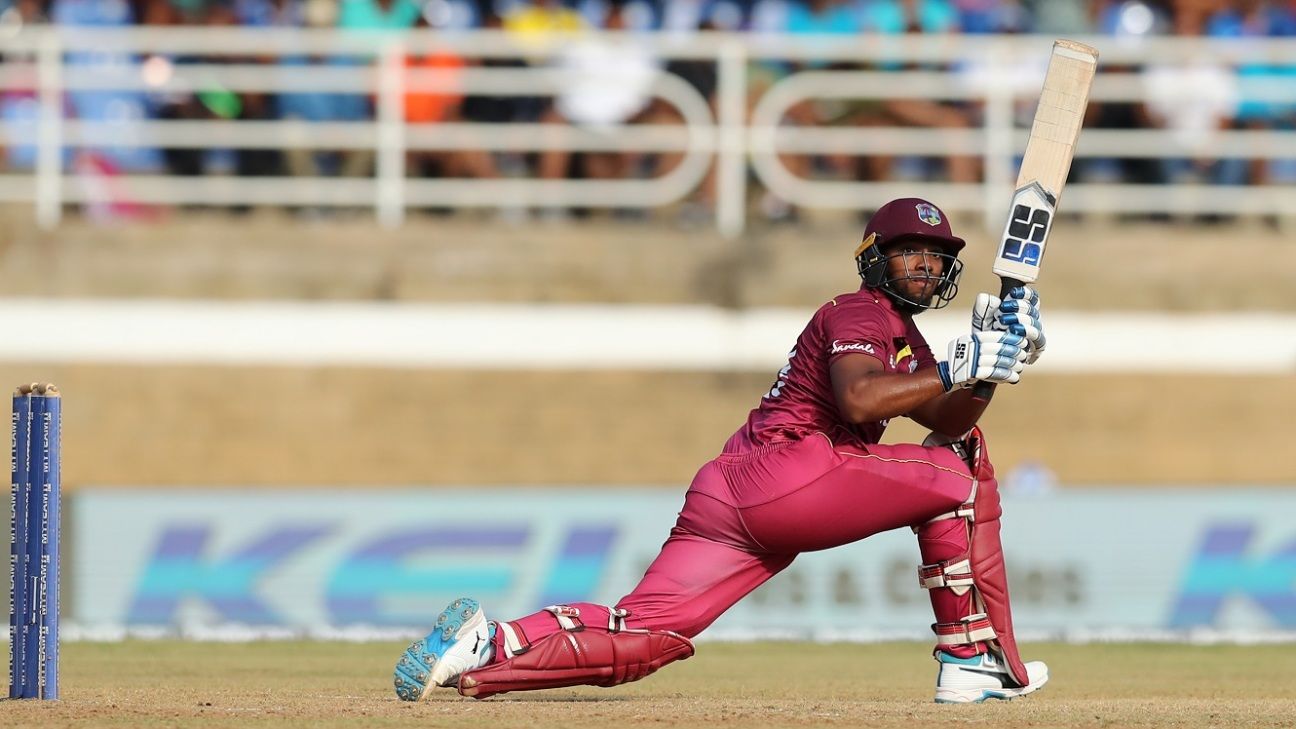
Former West Indies captain Dwayne Bravo has called Nicholas Pooran's attempts at altering the condition of the ball during West Indies' third ODI against Afghanistan a "silly mistake".
"I know Pooran since he was 17 years old and he is not that type of player," Bravo said on Thursday in Abu Dhabi where he will be playing in the T10 tournament as Maratha Arabians' captain. "Yes, that (ball-tampering) happened, the evidence is there. But deep down inside he doesn't mean anything [bad] to cheat or anything."
ALSO READ: Dwayne Bravo hints at international comeback
Pooran was banned for four T20Is after video footage showed him scratching the surface of the ball with his thumbnail. He admitted to the offence, a breach of level 3 of the ICC's Code of Conduct, and accepted the sanction proposed by match referee Chris Broad.
In his defence, the young batsman said it was an "isolated" incident, which would not be repeated as it was an "extreme error in judgment" on his part.
Pooran will now miss the ongoing three-match T20I series against Afghanistan and the opening match of the subsequent exchanges against India.
Bravo said Pooran needed to be given time to understand his mistake. "It is just a silly mistake on his part," Bravo said. "He accepted it. But I know the individual personally, and that is not something he will ever do or encourage anyone to do. It is just a simple mistake, he gets caught, he accepts it, but he is far from that type of player."


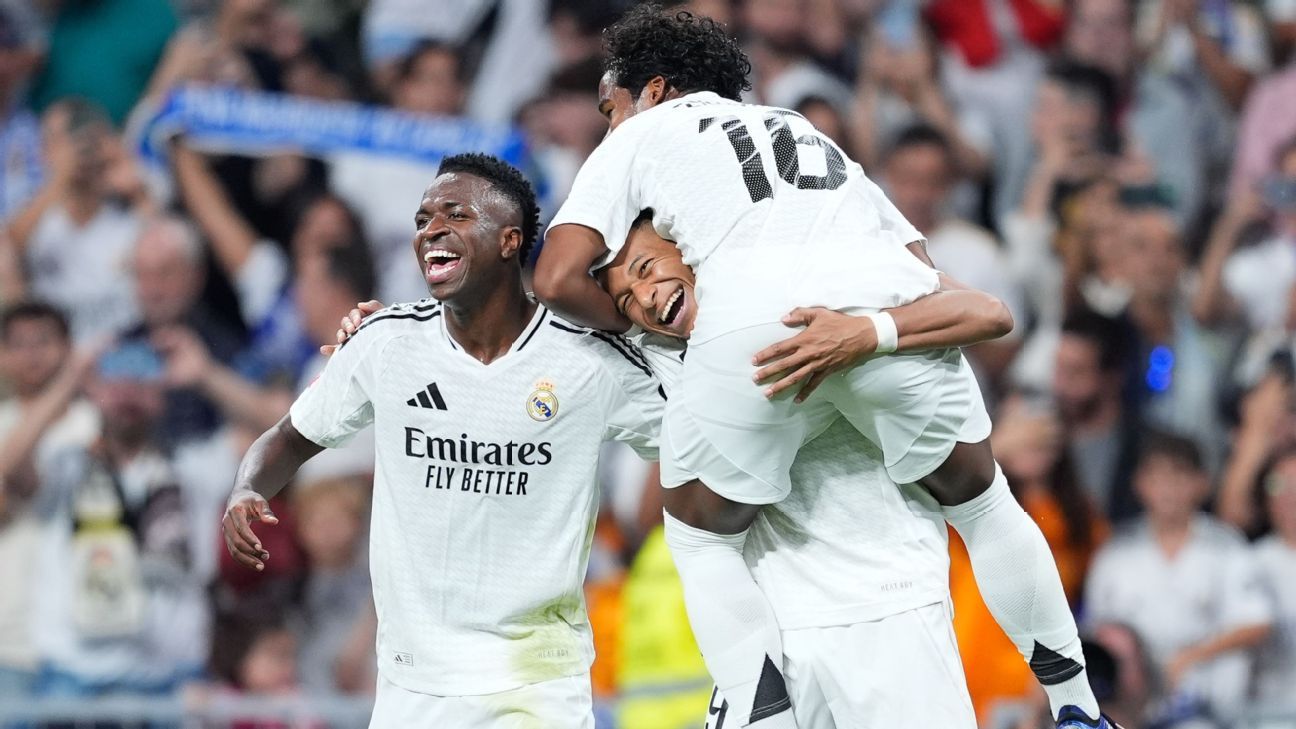

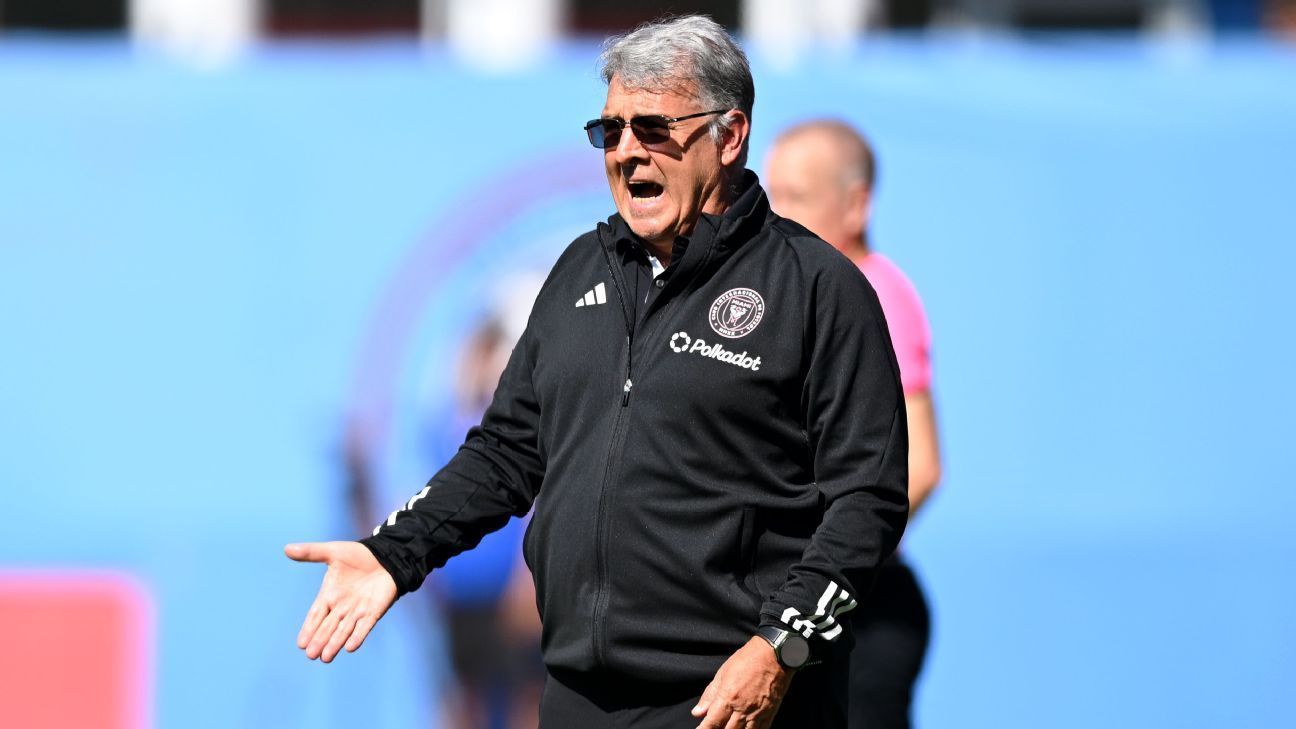







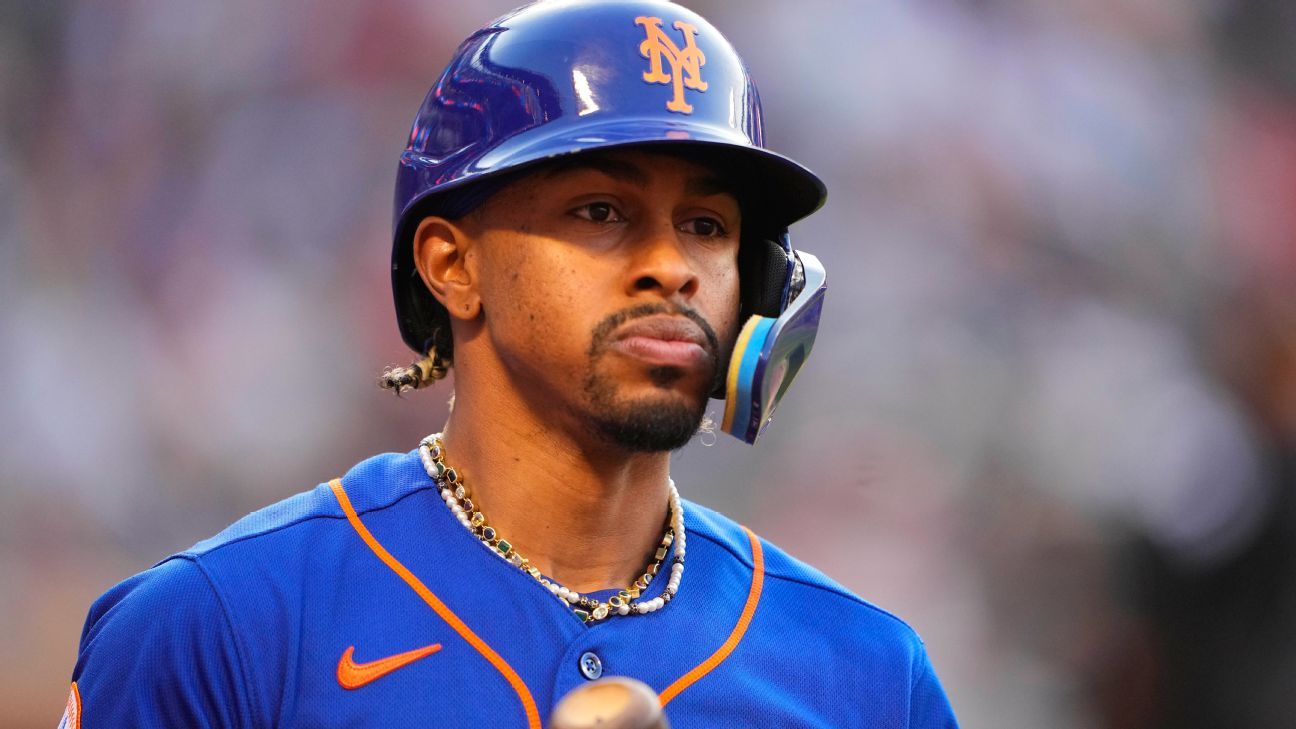


 Phone: (800) 737. 6040
Phone: (800) 737. 6040 Fax: (800) 825 5558
Fax: (800) 825 5558 Website:
Website:  Email:
Email: 






